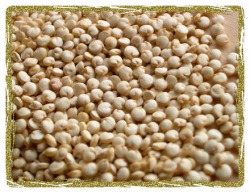Wild Organic Bolivian Quinoa

Jaime just came back from South America with delicious organic Bolivian quinoa, so it on the menu in our kitchen this week for sure! I thought I would say a few words about it.
Quinoa is a wild Andean native grain, and was the main food of the Incas and other ancient Andean cultures. It grows high in the Andes mountains, and it is the only known grain that provides us with all of the essential amino acids required by the human body to form protein. In other words, quinoa is a complete protein source. It truly is unique in this sense. No other grain provides us with as much protein as quinoa does. Compared to other grains, it is higher in many essential minerals as well, such as phosphorus, potassium, magnesium, iron, and calcium. For example, quinoa has 9267 mg of potassium to 100 grams of protein, and 2496 mg of magnesium to 100 grams of protein. Brown rice, as nutritionally dense as it is, has only 1183 mg of potassium to 100 grams of protein, and 735 mg of magnesium to 100 grams of protein. Brown rice contains 6.4 grams of fiber to 100 grams of dry weight, while quinoa only contains 3.8 grams of fiber per 100 grams of dry weight. And beans contain 28 grams of protein per 100 grams of dry weight compared to quinoa which contains 16.5. Brown rice contains 7.6. Soybeans contain 36.1 grams of protein per 100 grams of dry weight. It could all make us crazy in our noble attempts to eat healthy!! Which is why I always teach everyone, that there are many multitudes of known and unknown nutrients in the foods that we eat, so variety is always key. Brown rice contains many essential nutrients that quinoa may be lacking in, as do the many other grains, beans, and vegetables that we use. Certain foods are better for certain organs of the body, or better to use during certain seasons of the year. Focusing on only one type of grain, vegetable, cooking (or non cooking method), and thinking it superior in all ways is not the way to go, which is why we always offer so much variety on each of our menu's here at Wholly Macro.

Very interesting though is the fact that Bolivia is now growing and exporting many organic foods, quinoa included. Bolivia is a small and remote country. Maybe only on the map because of the famous movie Butch Cassidy And The Sundance Kid!! But still, they maintain a growing awareness of the importance of organic whole natural foods. Colombia does also. Jaime was telling me that they have a soy bean initiative happening in the town that he is from in Colombia, and that they have free classes there teaching the public how to grow, cultivate, and produce traditional soy foods such as tofu, soy milk, and tempeh. I find this just amazing. It is definitely a slower and more focused way of life down there. And they may have lost track somewhat, abandoning their basic roots, but it seems they are finding their way back quite well. We should all be doing the same, in this country and worldwide, in order to support and promote human health and well being, and planetary health and well being.
In health to you as always.
Gayle and Jaime
In health to you as always.
Gayle and Jaime

